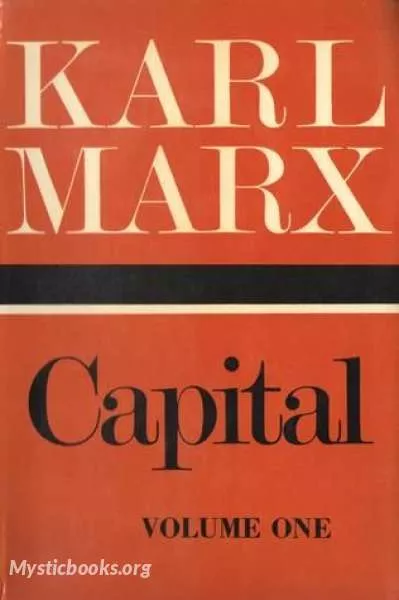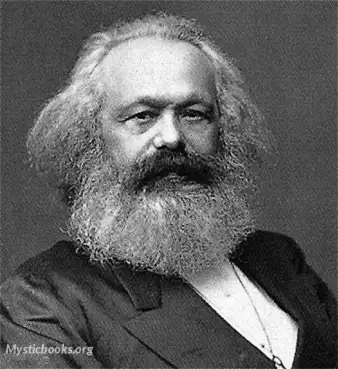
Capital: A Critical Analysis of Capitalist Production
by Karl Marx
'Capital: A Critical Analysis of Capitalist Production' Summary
In Das Kapital (1867), Marx proposes that the motivating force of capitalism is in the exploitation of labor, whose unpaid work is the ultimate source of surplus value. The owner of the means of production is able to claim the right to this surplus value because he is legally protected by the ruling regime through property rights and the legally established distribution of shares which are by law distributed only to company owners and their board members. The historical section shows how these rights were acquired in the first place chiefly through plunder and conquest and the activity of the merchant and "middle-man". In producing capital, the workers continually reproduce the economic conditions by which they labour. Das Kapital proposes an explanation of the "laws of motion" of the capitalist economic system from its origins to its future by describing the dynamics of the accumulation of capital, the growth of wage labour, the transformation of the workplace, the concentration of capital, commercial competition, the banking system, the decline of the profit rate, land-rents, et cetera. The critique of the political economy of capitalism proposes:
- Wage-labour is the basic "cell-form" (trade unit) of a capitalist society. Moreover, because commerce as a human activity implied no morality beyond that required to buy and sell goods and services, the growth of the market system made discrete entities of the economic, the moral, and the legal spheres of human activity in society; hence, subjective moral value is separate from objective economic value. Subsequently, political economy (the just distribution of wealth) and "political arithmetic" (about taxes) were reorganized into three discrete fields of human activity, namely economics, law and ethics - politics and economics were divorced.
- "The economic formation of society is a process of natural history". Thus, it is possible for a political economist to objectively study the scientific laws of capitalism, given that its expansion of the market system of commerce had objectified human economic relations. The use of money (cash nexus) voided religious and political illusions about its economic value and replaced them with commodity fetishism, the belief that an object (commodity) has inherent economic value. Because societal economic formation is a historical process, no one person could control or direct it, thereby creating a global complex of social connections among capitalists. The economic formation (individual commerce) of a society thus precedes the human administration of an economy (organised commerce).
- The structural contradictions of a capitalist economy (German: gegensätzliche Bewegung) describe the contradictory movement originating from the two-fold character of labour and so the class struggle between labour and capital, the wage labourer and the owner of the means of production. These capitalist economic contradictions operate "behind the backs" of the capitalists and the workers as a result of their activities and yet remain beyond their immediate perceptions as men and women and as social classes.
- The economic crises (recession, depression, et cetera) that are rooted in the contradictory character of the economic value of the commodity (cell-unit) of a capitalist society are the conditions that propitiate proletarian revolution—which The Communist Manifesto (1848) collectively identified as a weapon forged by the capitalists which the working class "turned against the bourgeoisie itself".
- In a capitalist economy, technological improvement and its consequent increased production augment the amount of material wealth (use value) in society while simultaneously diminishing the economic value of the same wealth, thereby diminishing the rate of profit—a paradox characteristic of economic crisis in a capitalist economy. "Poverty in the midst of plenty" consequent to over-production and under-consumption.
After two decades of economic study and preparatory work (especially regarding the theory of surplus value), the first volume appeared in 1867 as The Production Process of Capital. After Marx's death in 1883, Engels introduced Volume II: The Circulation Process of Capital in 1885; and Volume III: The Overall Process of Capitalist Production in 1894 from manuscripts and the first volume. These three volumes are collectively known as Das Kapital.
Book Details
Language
EnglishOriginal Language
GermanPublished In
1867Authors

Karl Marx
Prussia, Stateless
Karl Heinrich Marx was a German philosopher, economist, historian, sociologist, political theorist, journalist and socialist revolutionary. Due to his political publications, Marx became stateless an...
Books by Karl MarxDownload eBooks
Listen/Download Audiobook
- Select Speed
Related books

Modern Essays by Christopher Morley
This anthology, published in 1921, brings together thirty-three essays from notable British, American, and Canadian authors of the late 19th and early...

American Catholic Quarterly Volume 1 by Various
“American Catholic Quarterly” was a magazine published from 1876 to 1924. Founded by Herman J. Heuser and James A. Corcoran, the magazine focused on a...

Commune by Louise Michel
« La Commune » de Louise Michel est un récit poignant de l'insurrection parisienne de 1871, un événement qui a profondément marqué l'histoire de la Fr...

Influence of Monarchs by Frederick Adams Woods
An exploration of the relationship between the intellect and willpower of monarchs and the condition of their countries, based on a comparative analys...

Fatherland by Sir Henry Parkes
Fatherland is a collection of poetry by Sir Henry Parkes, a prominent Australian statesman often referred to as the 'Father of Federation.' While his...

World's Best Orations, Volume 2 by Various
This volume, part of a ten-volume set, presents a collection of notable orations from various fields, including the pulpit, legal proceedings, legisla...

Dialogues (Διάλογοι ) by Plato (Πλάτων)
Plato's *Dialogues* are a collection of philosophical works written in the form of conversations between Socrates and various characters. They explore...

Age of Anne by Edward Ellis Morris
This book explores the reign of Queen Anne, encompassing the significant events and cultural shifts that shaped England and Europe during her time on...

Knickerbocker's History of New York, Vol. 2 by Washington Irving
A History of New York, subtitled From the Beginning of the World to the End of the Dutch Dynasty, is an 1809 literary parody on the history of New Yor...

Fable of the Bees by Bernard Mandeville
Bernard Mandeville's "Fable of the Bees" is a provocative and influential work of philosophy that explores the relationship between individual vices a...
Reviews for Capital: A Critical Analysis of Capitalist Production
No reviews posted or approved, yet...